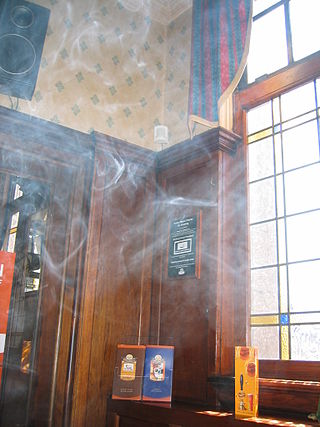Related Research Articles

Passive smoking is the inhalation of tobacco smoke, called passive smoke, secondhand smoke (SHS) or environmental tobacco smoke (ETS), by individuals other than the active smoker. It occurs when tobacco smoke diffuses into the surrounding atmosphere as an aerosol pollutant, which leads to its inhalation by nearby bystanders within the same environment. Exposure to secondhand tobacco smoke causes many of the same diseases caused by active smoking, although to a lower prevalence due to the reduced concentration of smoke that enters the airway.

Exhaust gas or flue gas is emitted as a result of the combustion of fuels such as natural gas, gasoline (petrol), diesel fuel, fuel oil, biodiesel blends, or coal. According to the type of engine, it is discharged into the atmosphere through an exhaust pipe, flue gas stack, or propelling nozzle. It often disperses downwind in a pattern called an exhaust plume.

Benzo[a]pyrene (BaP or B[a]P) is a polycyclic aromatic hydrocarbon and the result of incomplete combustion of organic matter at temperatures between 300 °C (572 °F) and 600 °C (1,112 °F). The ubiquitous compound can be found in coal tar, tobacco smoke and many foods, especially grilled meats. The substance with the formula C20H12 is one of the benzopyrenes, formed by a benzene ring fused to pyrene. Its diol epoxide metabolites, more commonly known as BPDE, react with and bind to DNA, resulting in mutations and eventually cancer. It is listed as a Group 1 carcinogen by the IARC. In the 18th century a scrotal cancer of chimney sweepers, the chimney sweeps' carcinoma, was already known to be connected to soot.

Diesel exhaust is the gaseous exhaust produced by a diesel type of internal combustion engine, plus any contained particulates. Its composition may vary with the fuel type or rate of consumption, or speed of engine operation, and whether the engine is in an on-road vehicle, farm vehicle, locomotive, marine vessel, or stationary generator or other application.
An environmental factor, ecological factor or eco factor is any factor, abiotic or biotic, that influences living organisms. Abiotic factors include ambient temperature, amount of sunlight, air, soil, water and pH of the water soil in which an organism lives. Biotic factors would include the availability of food organisms and the presence of biological specificity, competitors, predators, and parasites.

Tobacco products, especially when smoked or used orally, have negative effects on human health. Researchers have addressed concerns about these effects for a long time. They have focused primarily on cigarette smoking.
Exposure science is the study of the contact between humans and harmful agents within their environment – whether it be chemical, physical, biological, behavioural or mental stressors – with the aim of identifying the causes and preventions of the adverse health effects they result in. This can include exposure within the home, workplace, outdoors or any other environment an individual may encounter. The term ‘exposure’ is the umbrella term for many different types, ranging from ultraviolet exposure, exposure to the chemicals in the food we eat, to exposure to long working hours being the occupational factor most attributable to the burden of disease.

Radium and radon are important contributors to environmental radioactivity. Radon occurs naturally as a result of decay of radioactive elements in soil and it can accumulate in houses built on areas where such decay occurs. Radon is a major cause of cancer; it is estimated to contribute to ~2% of all cancer related deaths in Europe.

Roxana Moslehi is an Iranian-born genetic epidemiologist.
Sarah C. Darby is Professor of Medical Statistics at the University of Oxford. Her research has focused the beneficial effects of smoking cessation, the risk of lung cancer from residential radon, and treatments for early breast cancer. She is also a Principal Scientist with the Cancer Research UK in the Clinical Trial Service Unit (CTSU) and Epidemiological Studies Unit at the Nuffield Department of Clinical Medicine, at the Radcliffe Infirmary, Oxford.
Charles F. Lynch is a cancer researcher, whose work has been cited 30,000 times. He is a university professor at the University of Iowa. He is director of two large multi-decade studies.
Risk factors for breast cancer may be divided into preventable and non-preventable. Their study belongs in the field of epidemiology. Breast cancer, like other forms of cancer, can result from multiple environmental and hereditary risk factors. The term environmental, as used by cancer researchers, means any risk factor that is not genetically inherited.

The exposome is a concept used to describe environmental exposures that an individual encounters throughout life, and how these exposures impact biology and health. It encompasses both external and internal factors, including chemical, physical, biological, and social factors that may influence human health.
Molecular pathological epidemiology is a discipline combining epidemiology and pathology. It is defined as "epidemiology of molecular pathology and heterogeneity of disease". Pathology and epidemiology share the same goal of elucidating etiology of disease, and MPE aims to achieve this goal at molecular, individual and population levels. Typically, MPE utilizes tissue pathology resources and data within existing epidemiology studies. Molecular epidemiology broadly encompasses MPE and conventional-type molecular epidemiology with the use of traditional disease designation systems.

Joni L. Rutter is an American geneticist and director of the National Center for Advancing Translational Sciences (NCATS). Rutter was previously director of the scientific programs in the All of Us initiative and served as the neuroscience and behavior division director at the National Institute on Drug Abuse. Her scientific experience includes clinical research in human genetics and environmental risk factors focusing on the fields of cancer and addiction.

Xiaohong Rose Yang is an American biomedical scientist researching the genetics of dysplastic nevus syndrome and chordoma, and etiologic heterogeneity of breast cancer. She is a senior investigator at the National Cancer Institute. Yang leads breast cancer studies in mainland China, Hong Kong, and Malaysia.
Exposome-NL is a 10-year Dutch research program of multiple Dutch universities collaborating in the field of exposome research. Researchers from fields such as exposure science, environmental science, cardiovascular and metabolic health, clinical epidemiology, nutritional epidemiology, geosciences, agent-based modelling, molecular biology, chemistry and bioinformatics, and biostatistics work together within the Exposome-NL research program.

Debra Toby Silverman is an American biostatistician and epidemiologist specialized in bladder cancer epidemiology and the carcinogenicity of diesel exhaust. Silverman is the chief of the occupational and environmental epidemiology branch at the National Cancer Institute.
Wen-Yi Huang is a cancer epidemiologist who primarily researches colorectal and prostate tumors. She is a staff scientist in the metabolic epidemiology branch at the National Cancer Institute.
Francine Laden is an American epidemiologist who is Professor of Environmental Epidemiology at the Harvard T.H. Chan School of Public Health. Her research has investigated the environmental epidemiology of chronic disease. She serves as co-director of the Harvard University and Boston University center for research on environmental and social stressors in housing across the life course. Laden has also served on the United States Environmental Protection Agency advisory board.
References
- ↑ Utrecht University. "Prof. dr. ir. R.C.H. (Roel) Vermeulen" . Retrieved 2021-04-04.
- ↑ International Journal of Epidemiology, Oxford Academic (2020). "The impact of alternative historical extrapolations of diesel exhaust exposure and radon in the Diesel Exhaust in Miners Study (DEMS)". International Journal of Epidemiology. 49 (2): 459–466. doi:10.1093/ije/dyz189. PMC 7266543 . PMID 31539056 . Retrieved 2021-05-13.
- ↑ Oxford Scholarship (2017). Thun, Michael; Linet, Martha S; Cerhan, James R; Haiman, Christopher A; Schottenfeld, David (eds.). Cancer Epidemiology and Prevention. Oxford University Press. doi:10.1093/oso/9780190238667.001.0001. ISBN 9780190238698 . Retrieved 2021-05-13.
- ↑ Utrecht University. "Genotoxic exposure and biological effects in the rubber manufacturing industry" (PDF). Retrieved 2021-05-12.
- ↑ Silverman, Debra T.; Samanic, Claudine M.; Lubin, Jay H.; Blair, Aaron E.; Stewart, Patricia A.; Vermeulen, Roel; Coble, Joseph B.; Rothman, Nathaniel; Schleiff, Patricia L. (2012-06-06). "The Diesel Exhaust in Miners study: a nested case-control study of lung cancer and diesel exhaust". Journal of the National Cancer Institute. 104 (11): 855–868. doi:10.1093/jnci/djs034. ISSN 1460-2105. PMC 3369553 . PMID 22393209.
- ↑ Attfield, Michael D.; Schleiff, Patricia L.; Lubin, Jay H.; Blair, Aaron; Stewart, Patricia A.; Vermeulen, Roel; Coble, Joseph B.; Silverman, Debra T. (2012-06-06). "The Diesel Exhaust in Miners study: a cohort mortality study with emphasis on lung cancer". Journal of the National Cancer Institute. 104 (11): 869–883. doi:10.1093/jnci/djs035. ISSN 1460-2105. PMC 3373218 . PMID 22393207.
- ↑ Attfield, M. D.; Schleiff, P. L.; Lubin, J. H.; Blair, A.; Stewart, P. A.; Vermeulen, R.; Coble, J. B.; Silverman, D. T. (5 March 2012). "The Diesel Exhaust in Miners Study: A Cohort Mortality Study With Emphasis on Lung Cancer". JNCI Journal of the National Cancer Institute. 104 (11): 869–883. doi:10.1093/jnci/djs035. PMC 3373218 . PMID 22393207.
- ↑ Silverman, D. T.; Samanic, C. M.; Lubin, J. H.; Blair, A. E.; Stewart, P. A.; Vermeulen, R.; Coble, J. B.; Rothman, N.; Schleiff, P. L.; Travis, W. D.; Ziegler, R. G.; Wacholder, S.; Attfield, M. D. (5 March 2012). "The Diesel Exhaust in Miners Study: A Nested Case-Control Study of Lung Cancer and Diesel Exhaust". JNCI Journal of the National Cancer Institute. 104 (11): 855–868. doi:10.1093/jnci/djs034. PMC 3369553 . PMID 22393209.
- ↑ Utrecht University. "Roel Vermeulen appointed Professor of Environmental Epidemiology and Exposome Analysis" . Retrieved 2020-05-12.
- ↑ Het Parool. "Google gaat in Amsterdam de luchtvervuiling meten" (in Dutch). Retrieved 2021-05-13.
- ↑ European Respiratory Society. "Vermeulen, Roel European Respiratory Society" . Retrieved 2021-05-13.
{{cite journal}}: Cite journal requires|journal=(help) - ↑ Utrecht University. "Healthy Urban Living" . Retrieved 2021-05-10.
- ↑ Utrecht University. "26 million for research into the impact of non-genetic factors on health" . Retrieved 2021-05-01.
- ↑ European Commission. "EXposome Powered tools for healthy living in urbAN SEttings" . Retrieved 2021-05-01.
- ↑ Utrecht University. "Dies Natalis 2021 - 385 years of science in Utrecht" . Retrieved 2021-03-20.